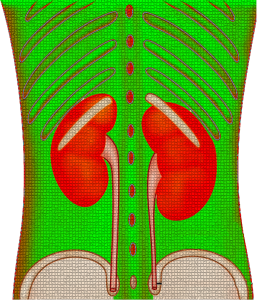According to the National Kidney Foundation, most of the 37 million American adults who have kidney disease are completely unaware of it. Often people attribute their symptoms to other conditions such as high-blood pressure, obesity and diabetes.
Kidneys play an important role in your overall health so it is important to learn how to take care of these vital organs.
Kidneys are bean-shaped organs about the size of an adult fist that act as your body’s filtering system. You have two kidneys, one on each side of the spine below the rib cage.
These organs might be small but they perform important and vital functions that help keep the rest of your body in balance and healthy.
Kidneys act as your body’s filtering system: They:
* Help remove waste and excess fluid
* Filter the blood regulating blood pressure and red blood cell production
* Produce nutrients and vitamins such as potassium and calcium
* Release hormones that help regulate blood pressure
The kidneys perform their life-sustaining job of filtering and returning to the bloodstream about 200 quarts of fluid every 24 hours … think about that for a moment – 200 quarts a day filtered by these two tiny organs!
1 in 3 U.S. adults are at risk for life-threatening kidney disease, but most don’t even know it.
Source: National Kidney Foundation
If you have a family history of kidney disease, suffer from high blood pressure, heart disease, diabetes, are overweight or over 60, you could be at risk for kidney disease.
Kidney disease increases your risk of developing life-threatening complications from other illnesses such as COVID-19.

* Regular Testing. If you are at risk for kidney disease, get tested annually. Early diagnosis can slow the progression of disease.
* Cut back on over-the-counter drugs such as ibuprofen. Nonsteroidal anti-inflammatory drugs (e.g., ibuprofen) can cause kidney damage if taken regularly, so if you are at risk for kidney disease reduce your usage and never exceed the maximum dosage.
* Eat Well: Avoid processed foods and reduce your saturated fat and sodium intake. Enjoy a healthy diet rich in vegetables, fruits and whole grains.
* Exercise regularly. 30 minutes of daily exercise keeps your bones, muscles and organs healthy. Exercising also helps lower your blood pressure and improve heart functioning —both critical factors in preventing kidney damage.
* Drink plenty of fluids. Water helps flush sodium and toxins from your kidneys. It’s recommended that men should get about 15 ½ cups of fluids each day, and women need about 11 ½ cups.
* Control Blood Pressure and Diabetes. High blood pressure and diabetes are the leading causes of kidney disease and kidney failure. Managing high blood pressure and strict control of blood sugar levels can slow the progression of kidney disease.
Chronic kidney disease includes conditions that damage your kidneys and decrease their ability to keep you healthy by filtering wastes from your blood. If kidney disease worsens, wastes can build to high levels in your blood and make you feel sick. Kidney disease also increases your risk of having heart and blood vessel disease. These problems may happen slowly over a long time.
Early detection and treatment can often keep chronic kidney disease from getting worse.
Most people may not have any severe symptoms until their kidney disease is advanced. However, you may notice that you:
* Are often tired and have less energy/trouble concentrating
* Have a poor or decreased appetite
* Have trouble sleeping and/or muscle cramping at night
* Have swollen feet and ankles
If you’re at risk for kidney disease due to high blood pressure, diabetes, a family history of kidney failure or if you’re older than age 60, it’s important to get tested annually for kidney disease. Be sure to mention any symptoms you’re experiencing to your healthcare practitioner.
Up-to-date. Down-to-earth. Close to home. Lots of great reasons to make Mason City Clinic
your first choice for all your family’s specialty healthcare needs.
250 S. Crescent Drive, Mason City, IA 50401
Tel: 641.494.5200
Toll Free: 800-622-1411
Fax: 641.494.5403